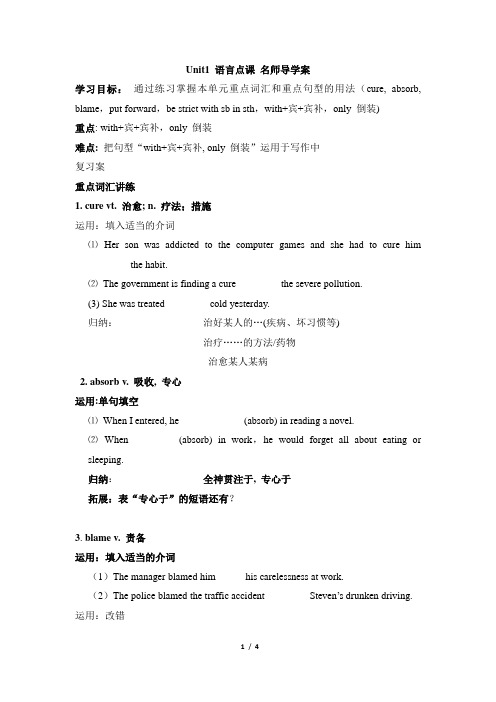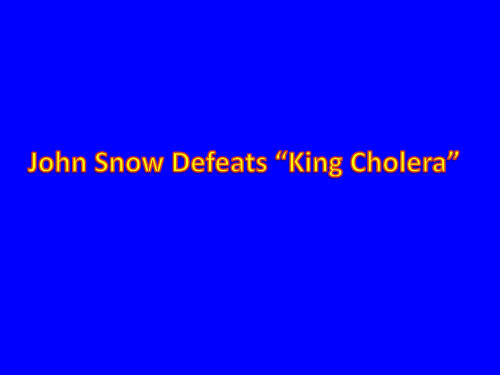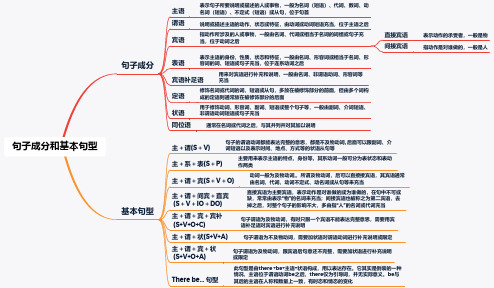[高中英语]图解教材(思维导图+微试题)人教高中英语必修5学案:Unit 1 Great scientists
Unit 1 人教版英语必修5同步精品课件(共18页)

Unit 1 人教版英语必修5同步精品课件(共18 页)
Unit 1 人教版英语必修5同步精品课件(共18 页) Unit 1 人教版英语识链接
Unit 1 人教版英语必修5同步精品课件(共18 页)
Inventor,physicist,surveyor, astronomer,biologist,artist...Robert Hooke was all these and more.Some say he was the greatest experimental scientist of the seventeenth century.Once he worked with renowned men of science like Christian Huygens, Antony van Leeuwenhoek,Robert Boyle, Isaac Newton and the great architect,Christopher Wren.
新课标导学
英语
必修⑤ ·人教版
Unit 1
Great Scientists
1
学习目标展示
2
背景知识链接
学习目标展示
类别
课程标准要求掌握的项目
话题 How to organize scientific research;contributions of scientists
词汇
characteristic radium painter scientific conclude conclusion analyse defeat expert attend physician expose cure challenge victim absorb suspect enquiry neighbourhood severe pump foresee blame pollute handle link announce instruct construct construction contribute firework chart positive movement backward spin enthusiastic cautious reject universe
人教课标版高中英语必修5Unit1_语言点课_名师导学案

Unit1 语言点课名师导学案学习目标:通过练习掌握本单元重点词汇和重点句型的用法(cure, absorb, blame,put forward,be strict with sb in sth,with+宾+宾补,only 倒装)重点: with+宾+宾补,only 倒装难点:把句型“with+宾+宾补, only 倒装”运用于写作中复习案重点词汇讲练1. cure vt. 治愈; n. 疗法;措施运用:填入适当的介词⑴Her son was addicted to the computer games and she had to cure him________ the habit.⑵The government is finding a cure ________ the severe pollution.(3) She was treated ________ cold yesterday.归纳:________________ 治好某人的…(疾病、坏习惯等)________________ 治疗……的方法/药物_________________ 治愈某人某病2. absorb v. 吸收, 专心运用:单句填空⑴When I entered, he ____________ (absorb) in reading a novel.⑵When _________(absorb) in work,he would forget all about eating orsleeping.归纳:________________ 全神贯注于, 专心于拓展:表“专心于”的短语还有?________________________________________ 3. blame v. 责备运用:填入适当的介词(1)The manager blamed him _____ his carelessness at work.(2)The police blamed the traffic accident ________ Steven’s drunken driving. 运用:改错(3)I do not blame you, but I blame me.(4)The children were not to blame on the accident.归纳:_________________为某事责备某人__________________把某事归咎于某人__________________(为某事)承担责任4. put forward运用:猜词义⑴We’ve put the wedding forward by two weeks. (意思________________ )⑵Mr. Smith put forward a suggestion that we should set up a special department.(意思___________ )⑶Her name was put forward for the lead role in the play. (意思__________ )拓展:储存__________________ 推迟_________________记下__________________ 扑灭_________________建造;搭起____________ 忍耐;忍受___________5. ___________________________ (在某方面)对某人严格要求运用:⑴Our English teacher is very strict ___ us __ our homework.⑵(改错) My mother is strict at her work and is also strict with me.写作句型仿写1. We walked happily in the forest with the birds singing.句型:with+宾+宾补(doing(表_________)/done(表___________)/to do(表___________)在语法填空中的运用:1. With a lot of homework _________(do), I can’t go to see the movie with youtonight.2. ________ people giving him food, clothing, and shelter, he simply saved andinvested everything .在短文改错中的运用:1. With hands tie, he couldn’t escape.●仿写:做完一切后, 他高高兴兴地出去踢足球了____________________________________________________________________2. Only if you are in London can you realize its beauty.●句型:Only +副词/介词短语/状语从句, 后用部分倒装●仿写:1. 只有用这种方法, 你才能在这么短的时间内完成它。
人教高中英语必修5Unit1Reading (共43张PPT)

map.
_7__ He announced that the water carried the disease.
_3__ John Snow investigated two streets where the outbreak was very severe.
He is … Humphry Davy
Who is he?
Who put forward a theory about black holes?
He is … Stephen Hawking
1. Do you know how to prove a new idea in scientific research? Discuss in small groups the stages in setting out a new scientific idea. What order would you put them in?
Small, white, flocculent particles
Stage 6 Find
Found supporting
seuxptproaretivnigdeenvcidee:nAcewfroommatnwaonodthherer
edvaiduegnhcteer wdheaothlisv:eBdoftahrofawthaemy bduietd
Public house
No death happened here.
The water from the pump was to blame.
The water was from the river which had been polluted by the dirty water from London.
人教版高中英语必修5课件说课 unit1(John Snow defeats ‘King Gholera’) (共40张PPT)

Thank you for attention!
所谓说课是教师在备课的基础上,面对评委、同行、系统地 口头表述自己的教学设计及其理论依据,然后由听者评说,达 到相互交流,共同提高的目的的一种教学研究形式。 说课的基本步骤
一、说教材 1、教材的地位: 从地位上、结构上、内容上、教育意义上等方面论述本节教材在本课\本书中的地位和作用。 2、教学目标: 根据新课程标准的要求、学生年龄特点、生活经验、认识问题的层次、程度、学生发展的需要等方面制定出三维学 习目标。 3、教学重点、难点: 从教学内容、课标要求、学生实际、理论层次、对学生的作用等方面找出确立重点难点的依据并确定教学的重点和 难点。 二、说教法 依据《纲要》、课标的四性、新理念、新教法等理论具体说明将在课堂设计中运用那些方法。这里可以从大的方面 ,从宏观上来说一下,具体详细可以放在下一个教学程序里说明。如: 1、参与式 2、讨论式 3、互动式 4、体验式 5、研究性学习 6、谈话、对话、辩论、调查、情景模拟、亲历体验、小活动等 三、说学法 依据新的教学理念、学习方式的转变,说出所倡导自主、合作、探究等方式方法。达到体验中感悟情感、态度、价 值观;活动中归纳知识;参与中培养能力;合作中学会学习。 四、说教学程序 主体部分:说出教学的基本环节、知识点的处理、运用的方法、教学手段、开展的活动、运用的教具、设计的练习 、学法的指导等。并说出你这样设计的依据是什么。 五、说板书 一般正规的说课如果时间允许的情况下,是要在说教学程序的过程中写出板书提纲的。如果时间很紧张,你可以提 前写在一张大纸上,张贴在黑板上也可以。能够配合讲解适时出示,达到调控学生、吸引注意、使师生思路合拍共振 的目的 说出这样设计的理由。如:能体现知识结构、突出重点难点、直观形象、利于巩固新知识、有审美价值等。
高一英语人教版(2019)必修第一册思维导图

句子成分和基本句型句子成分主语表示句子所要说明或描述的人或事物,一般为名词(短语)、代词、数词、动名词(短语)、不定式(短语)或从句,位于句首谓语说明或描述主语的动作、状态或特征,由动词或动词短语充当,位于主语之后宾语指动作所涉及的人或事物,一般由名词、代词或相当于名词的词组或句子充当,位于动词之后直接宾语表示动作的承受者,一般是物间接宾语指动作是对谁做的,一般是人表语表示主语的身份、性质、状态和特征,一般由名词、形容词或相当于名词、形容词的词、短语或句子充当,位于连系动词之后宾语补足语用来对宾语进行补充和说明,一般由名词、非谓语动词、形容词等充当定语修饰名词或代词的词、短语或从句,多放在被修饰部分的前面,但由多个词构成的定语则通常放在被修饰部分的后面状语用于修饰动词、形容词、副词、短语或整个句子等,一般由副词、介词短语、非谓语动词短语或句子充当同位语通常在名词或代词之后,与其并列并对其加以说明基本句型主+谓(S+V)主+系+表(S+P)主要用来表示主语的特点、身份等。
其系动词一般可分为表状态和表动作两类主+谓+宾(S+V+O)主+谓+间宾+直宾(S+V+IO+DO)直接宾语为主要宾语,表示动作是对谁做的或为谁做的,在句中不可或缺,常常由表示“物”的名词来充当;间接宾语也被称之为第二宾语,去掉之后,对整个句子的影响不大,多由指“人”的名词或代词充当主+谓+宾+宾补(S+V+O+C)句子谓语为及物动词,有时只跟一个宾语不能表达完整意思,需要用宾语补足语对宾语进行补充说明主+谓+状(S+V+A)句子谓语为不及物动词,需要加状语对谓语动词进行补充说明或限定主+谓+宾+状(S+V+O+A)句子谓语为及物动词,跟宾语后句意还不完整,需要加状语进行补充说明或限定T here be... 句型此句型是由there +be+主语+状语构成,用以表达存在。
它其实是倒装的一种情况,主语位于谓语动词be之后,there仅为引导词,并无实际意义。
人教版高中英语必修5Unit 1全单元 PPT课件 图文

6.Who invented the way of giving electricity to everybody in large cities?
Thomas Edison (1847-1931) an American inventor
Bell
Newton
Galileo
Edison
Watt
Curie
Franklin
Einstein
Joule
Nobel
Flaming
Hawking
杨振宁
李政道
丁肇中
李远哲
朱棣文
崔琦
王选
袁隆平
钱学森
陈景润
2. Try the quiz on P1 and find out who knows the most.
What do you know about cholera?
• Cholera is caused by a bacterium called Varian cholera(霍乱弧菌).
It infects people’s intestines (肠胃), causing diarrhea(腹泻), vomiting and leg cramps (腿抽筋). The most common cause of cholera is people eat food or drink water that has been polluted by the bacteria.
•AIDS,SARS are infectious diseases 1. Infectious diseases can be spread easily.
图解教材(思维导图+微试题)人教高中英语必修1学案:Unit 4 Earthquakes正式版

必修1 第4单元Earthquakes【思维导图】【微试题】1.The news of his wife's death was ________________________ him.他妻子去世的消息对他打击太大了。
【答案】a terrible shock to2.After the divorce, she __________________ her work.离婚后,她埋头于工作。
【答案】buried herself in3.______________ his accent, he must be a southerner.根据他的口音判断,他一定是个南方人。
【答案】Judging from/by4.[2014山东高考]阅读理解。
One morning, Ann’s neighbor Tracy found a lost dog wandering around the local elementary school. She asked Ann if she could keep an eye on the dog. Ann said that she could watch it only for the day.Tracy took photos of the dog and printed off 400 FOUND fliers(传单), and put them in mailboxes. Meanwhile, Ann went to the dollar store and boug ht some pet supplies, warning her two sons not to fall in love with the dog. At the time, Ann’s son Thomas was 10 years old, and Jack, who was recovering from a heart operation, was 21 y ears old. Four days later Ann was still looking after the dog, whom they had started to call Riley. When she arrived home from work, the dog threw itself against the screen door and barked madly at her. As soon as she opened the door, Riley dashed into the boys’ room where Ann found Jack suffering from a heart attack. Riley ran over to Jack, but as soon as Ann bent over to help him the dog went silent.“If it hadn’t come to get me, the doctor s aid Jack would have died,” Ann reported to a local newspaper. At this point, no one had called to claim the dog, so Ann decided to keep it.The next morning Tracy got a call. A man named Peter recognized his lost dog and called the number on the flier. Tracy started crying, and told him, “That dog saved my friend’s son.”Peter drove to Ann’s house to pick up his dog, and saw Thomas and Jack crying in the window. After a few moments Peter s aid, “Maybe Odie was supposed to find you, maybe you should keep it.”41. What did Tracy d o after finding the dog?A. She looked for its ownerB. She gave it to Ann as a gift.C. She sold it to the dollar store.D. She bought some food for it.42. How did the dog help save Jack?A. By breaking the door for Ann.B. By leading Ann to Jack’s room.C. By dragg ing Jack out of the room.D. By attending Jack when Ann was out.43. What was Ann’s attitude to the dog according to Paragraph 4?A. SympatheticB. DoubtfulC. TolerantD. Grateful44. For what purpose did Peter call Tracy?A. To help her friend’s son.B. To interview TracyC. To take back his dog.D. To return the flier to her.45. What can we infer about the dog from the last paragraph?A. It would be given to Odie.B. It would be kept by Ann’ family.C. It would be returned to Peter.D. It would be taken away by Tracy.【答案】1-5AB DCB【解析】文章讲述了一只走失的小狗和收留它的人家之间发生的感人故事;(1).答案:A解析:由第二段“Tracy took photo of the dog and printed off 400…..and put them in maiboxes.”可知,Tracy 是在印传单,登招领启事,故答案选A:寻找狗的主人。
人教版高中英语必修5_unit_1_单词讲解 PPT课件 图文

• put away/aside 放在一边;收拾起来;储存 • put down 写下;镇压;放下 • put off 延期,推迟(后接doing) • put on 穿上;(速度、体重)增加;上演 ;假装 • put out 扑灭,熄灭 ;出版 • put up 举起;建造;张贴 • put up with 忍受,忍耐,容忍
6. defeat vt. 打败;战胜;使受挫;n. (c)失败;战胜 • defeat/beat/win这三个单词用法
这三个词都有“赢”的意思,但其用法不尽相同:
(1)defeat和beat用法相同,其宾语必须是 “人或某个集体”。如a team, a class, a school, an army等。注意:defeat侧重在战 场上打败敌人,beat常用于游戏或比赛中, 但在平时运用中常替换使用。
• treat sb. for sth.医治某人的病;还可作“对 待,看待”讲,treat...as把……看作/视为。 (2)cure意为“治愈,痊愈”,特别指病后的恢
复健康。其后可接表示疾病的名词或代词,也可 接sb. of再加表示疾病的名词。另外,还可作“矫 正,纠正”解,借喻指消除社会上某种不良现象
challengeable 挑战性的 • n. (c)challenger 挑战者
15.absorb vt. 吸收,吸进(液体、气体等); 理解,获取(信息);吸引住某人的注意力或 兴趣 absorb water(=take in) 吸收水 absorb what sb. said 理解某人所说的话 absorb one's attention 吸引某人的注意力 be absorbed in... 全神贯注于……
或个人恶习等。 (3)heal意为“治愈”,多用于治愈外伤, 如:wound, cut, injury, burn等。
- 1、下载文档前请自行甄别文档内容的完整性,平台不提供额外的编辑、内容补充、找答案等附加服务。
- 2、"仅部分预览"的文档,不可在线预览部分如存在完整性等问题,可反馈申请退款(可完整预览的文档不适用该条件!)。
- 3、如文档侵犯您的权益,请联系客服反馈,我们会尽快为您处理(人工客服工作时间:9:00-18:30)。
【图解教材】之文档:人教必修5 Unit 1 Great scientists 【思维导图】
【微试题】
1. ____________, wish all of you good health and a long life.最后祝大家健康长寿.
【答案】To conclude
2. He didn‘t __________________ yesterday.他昨天没有参加会议.
【答案】attend the meeting
3. It’s very dangerous to _______________ these viruses without any protection.
不加任何保护,直接暴露在这些病毒下是非常危险的..
【答案】be exposed
4.阅读理解.
They baby is just one day old and has not yet left hospital. She is quiet but alert (警觉). Twenty centimeters from her face researchers have placed a white card with two black spots on it. She stares at it carefully. A researcher removes the card and replaces it by another, this time with the spots differently spaced. As the cards change from one to the other, her gaze(凝视)starts to lose its focus — until a third, with three black spots, is presented. Her gaze returns: she looks at it for twice as long as she did at the previous card. Can she tell that the number two is different from three, just 24 hours after coming into the world?
Or do newborns simply prefer more to fewer? The same experiment, but with three spots shown before two, shows the same return of interest when the number of spots changes. Perhaps it is just the newness? When slightly older babies were shown cards with pictures of objects (a comb, a key, an orange and so on), changing the number of objects had an effect separate from changing the objects themselves. Could it be the pattern that two things make, as opposed to three? No again. Babies paid more attention to squares moving randomly on a screen when their number changed from two to three, or three to two. The effect even crosses between senses. Babies who were repeatedly shown two spots became more excited when they then heard three drumbeats than when they heard just two; likewise (同样地)when the researchers started with drumbeats and moved to spots.
1. The experiment described in Paragraph 1 is related to the baby’s__.
A. sense of hearing
B. sense of sight
C. sense of touch
D. sense of smell
2. Babies are sensitive to the change in______.
A. the size of cards
B. the colour of pictures
C. the shape of patterns
D. the number of objects
3. Why did the researchers test the babies with drumbeats?
A. To reduce the difficulty of the experiment.
B. To see how babies recognize sounds.
C. To carry their experiment further.
D. To keep the babies’ interest.
4. Where does this text probably come from?
A. Science fiction.
B. Children’s literature.
C. An advertisement.
D. A science report.
【答案】1-4 BDCD
【解析】这是一篇医学实验报告,是对孩子的视觉实验.
(1).【答案】B
【解析】根据文章第一段she stares it carefully. Her gaze starts to lose its focus可知,本段是对孩子的视觉实验,故选B.
(2).【答案】D
【解析】根据文章第二段Babies pay more attention to squares moving randomly on a screen when their number changed from two to three, three to two可知D项正确.
(3).【答案】C
【解析】根据文章第一段得知对孩子视力进行实验,接下来用鼓对孩子的听力继续实验,故选C.
(4).【答案】D
【解析】综观全文,这是一篇医学实验报告,故选D.。
